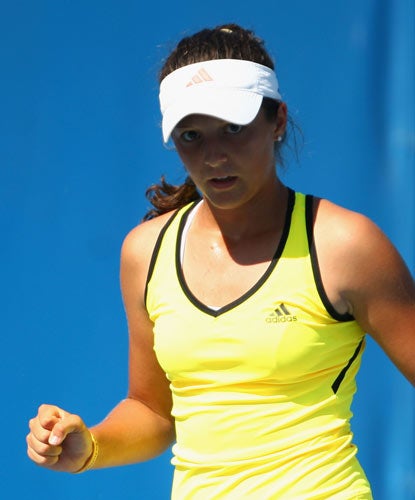Robson ready for Wimbledon exam

Like most British 15-year-olds, Laura Robson has been sitting her school-leaving exams but the stress of studying is likely to pale in comparison to the pressure she will face at All England Club next week.
Presented with a wildcard into the main draw thanks to her run to the junior title 12 months ago, bubbly Robson is poised to become the youngest girl to compete at Wimbledon since Martina Hingis made her presence felt in 1995 as a 14-year-old.
Unlike Hingis, who could slip under the radar thanks to being a Swiss prodigy, Robson will find she will have nowhere to hide as she hails from a nation starved of tennis success.
Last year Robson shunted Venus Williams off the front and back pages of British newspapers after winning the girls' title on the same day the American captured her fifth Rosewater Dish.
If that was the impact of a junior title, Robson can expect everything she does and says to be analysed to the nth degree over the next fortnight.
"From the sounds of it, there is going to be quite a lot of pressure on me," the 484th-ranked Robson told British media recently.
"I don't know what I am going to do but all I can do is go on court and try my best. Win or lose, if I have tried my best then I cannot be unhappy."
It is a road well travelled by the likes of Hingis and Monica Seles - both of whom were teenage prodigies who found a way to survive the hype and excel in their chosen field.
Seles, who went on to win nine grand slam titles, said Robson should embrace all the attention rather than get daunted by it.
"She should go out there and enjoy it. If she starts getting nervous just remember why you started playing tennis and go back to that simplicity ... that thought has helped me so much in my tennis career," Seles told Reuters in an interview.
"When you are on the world stage it's normal to get nervous and as Billie Jean King said 'pressure is a privilege'."
It is yet to be seen in which category Robson will fall into when it comes to handling pressure.
While Britain's Tim Henman thrived on all the attention and expectation heaped on him during Wimbledon, Amelie Mauresmo dreaded going home to Paris in May for the French Open.
The Frenchwoman captured majors at the Australian Open and Wimbledon but simply crumbled at the thought of being under the spotlight in front of her home fans.
Seles said there was no manual available to teach someone how to deal with all the attention.
"The only advice I ever got was just deal with it and go ... in tennis you are only as good as your last few tournaments ... on the court you really don't have much time to think so for me that was never really a problem," said the American, who has highlighted some of the pitfalls she faced on tour in her new book 'Getting a grip: On my game, my body, my mind... myself'.
Striking the right balance between doing well and dealing with the high-pressure world of professional sport is easier said than done.
Tennis is littered with teenage casualties such as Jennifer Capriati, Tracy Austin and Andrea Jaeger.
While Austin and Jaeger were victims of burnout, Capriati simply had enough of being the most hyped American prodigy to hit the tennis circuit.
At 13 she was worth $6 million, showered with endorsement contracts even before she played her first professional match in March 1990.
In 1991, she became the youngest ever Wimbledon semi-finalist at the age of 15. But within two years Capriati had tired of the game and was arrested for shoplifting and for possession of marijuana.
At 18, when most teenagers are just starting out in life, Capriati had become the ultimate role model for failure. It took her another six years to fulfil her potential, when she won her first major at the Australian Open in 2001.
It is a tale that Seles is well aware of and she pointed out that while all the attention can be intoxicating, it can also be very fickle.
"After I got stabbed (at a Hamburg event in 1993) I got to see the other side when I realised a lot of people didn't care about me once I wasn't number one. It helped me learn who my true friends and supporters were," said Seles, who rose to the top aged 17.
It is something Robson and her support group will need to keep in mind as she begins her journey towards grand slam success.
Join our commenting forum
Join thought-provoking conversations, follow other Independent readers and see their replies
Comments
Bookmark popover
Removed from bookmarks